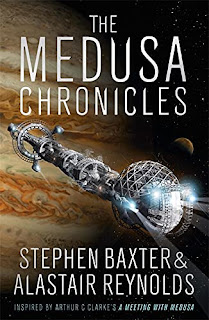The Medusa Chronicles - Stephen Baxter and Alastair Reynolds
Science, technology, cybernetics and biological enhancements have advanced considerably in the time since Clarke's original novella, and a lot more is known about the planets in the solar system and about what lies beyond it. Baxter and Reynolds take this into account in The Medusa Chronicles, which remains nonetheless within the solar system, but they take Falcon and the world of the novella much further, ambitiously imagining and exploring what use humanity might put those scientific developments between the years 2099 to 2850. That's a long time for a human, a long time even for a cybernetically enhanced man (longer if you include the book's alternate-world 1967 interludes), but a negligible period for machines and a mere blink of insignificance in cosmic terms. Still there's room for a lot to happen, and the authors push those solar system frontiers - and science - to its limits.
This is the kind of time span and subject that Reynolds at least has been very successful at exploring in previous works, in his Revelation Space trilogy, and on an unimaginable scale in Pushing Ice. There's consequently an enormous scope to The Medusa Chronicles that seems to extend far beyond the intentions and ambitions of the original novella, but the authors also clearly want to address some of the wider issues in this and other Arthur C. Clarke's works; on matters such as artificial and enhanced intelligence. In the original A Meeting with Medusa novella that didn't extend much beyond the creatures that Falcon found on Jupiter, the Medusa, but enhanced super chimps or 'simps' also hinted at the abuses of scientific knowledge and the capacity of mankind to misuse their knowledge. Or perhaps the better word would be underestimate its implications.
That thread is the one most developed in The Medusa Chronicles. If knowledge of space exploration is more advanced, so too is the area of biology and stem-cell science. This has implications for longevity in the novel, widening its scope, taking a broader look at the issues that might arise in the future and how the World Government (and the dynasties that contribute to its makeup) might respond to the threats that arise to mankind's place in the solar system. It also allows for... wait for it... more intelligent machines, and the capacity for things to go very badly wrong there. If you've ever come across the planet-stripping Machines in Reynolds' Revelation Space novels or the self-replicating swarms of The Prefect (I'm less familiar with Baxter's writing), you have some indication where the joint authors of The Medusa Chronicles are capable of taking Arthur C. Clarke's creations over the span of almost a millennium.
You don't need to speculate into the far future to see how human endeavour is likely to fall foul of misjudgement, greed and misuse. There are plenty of examples in the past of the same mistakes being made time and time again, and the authors draw meaningful parallels to past wars, atrocities, expansion and colonisation as a way of considering whether humans will really do anything different in the future, or whether they will only find bigger and more inventive better ways to screw up on a colossal cosmic scale. The solution put forward - and it's impressive that the authors strive to put a speculative but realistic and positive spin on this - would seen to lie in the realm somewhere between man and machine. Occupying that space to an extent in Arthur C. Clarke's novella, and now capable of bridging the vast distance between the years, Commander Howard Falcon is an ideal figure to observe and explore such ideas, and Baxter and Reynolds are the ideal writers to take this on. They capture a sense of the awe of the universe and the humility of the position of humanity within it, but they also clearly have a lot of fun with some very old SF genre conventions in the process.
The Medusa Chronicles by Stephen Baxter and Alastair Reynolds is published by Gollancz on 19th May 2016.




Comments
Post a Comment